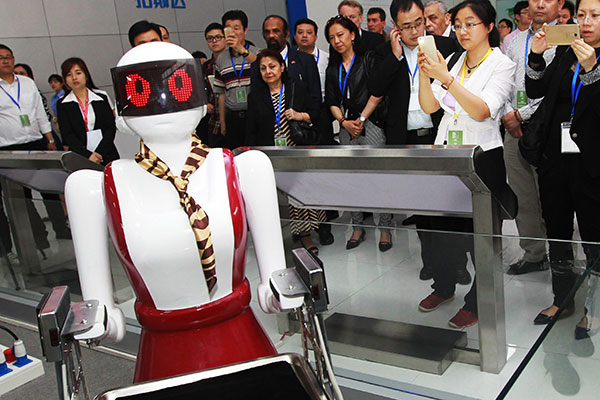
Foreign diplomats and business executives visit a robotics company in Dongguan, Guangdong province, on April 20, 2016.[Photo provided to China Daily]
Dongguan, a Pearl River Delta city once known primarily for its labor-intensive manufacturing, is turning toward scientific innovation for its future sustainable economic growth.
According to Chen Zhongqiu, director of the Dongguan bureau of commerce, the city government invests more than 2 billion yuan ($307 million) annually on developing science and technology, plus another 1 billion yuan on attracting world-class talent.
“A number of high-tech industrial zones and incubation parks have been established to help the city develop an innovative scientific industry and upgrade its industrial structure,” Chen told a group of foreign diplomats and business executives visiting the city on April 20.
“Dongguan is seeking to further expand its ties with the rest of the world to help achieve its goal.”
In addition to luring direct foreign investment, the city government is prioritizing development of its exhibitions and conventions sector-with more than 100 international exhibitions, fairs, conventions and related events held there every year, Chen said.
The development of Dongguan as an exhibition and convention center is helped by its location, between Guangdong’s capital, Guangzhou, and the Hong Kong Special Administrative Region.
The 2016 China Processing Trade Products Fair, which opened in Dongguan on April 21, is an example of the sort of event that offers a platform for the city to expand Sino-foreign cooperation.
According to Chen, special seminars, lectures and industrial summits will also beheld during the fair to help domestic processing firms upgrade their industrial structures.
Dongguan will also organize the annual Guangdong 21st Century Silk Road International Expo in October, which is aimed at expanding cooperation between nations and regions along the ancient maritime Silk Road.
Last year, the city’s GDP reached more than 620 billion yuan ($95.8 billion), while its foreign trade volume came to more than $160 billion, making Dongguan one of the top five exporter cities on the Chinese mainland.
Gabor Nagy, director of the Hungary-China Economic and Cultural Co and former deputy head of the Hungarian embassy in China, predicts a bright future for Dongguan if the city government focuses on science, technology and innovation.
“The robots produced in this city are great and of high quality,” said Nagy. “They might be able to use robots to make robots in the near future.”
And Ragnar Balduson, minister-counselor and vice-minister of the Icelandic embassy in China, said great changes had occurred in Dongguan since he first visited the city in 1998.
“Dongguan has now become a modern international metropolis, thanks to the development of new and high-tech industries, compared with the small agricultural city it was 18 years ago,” he said.
